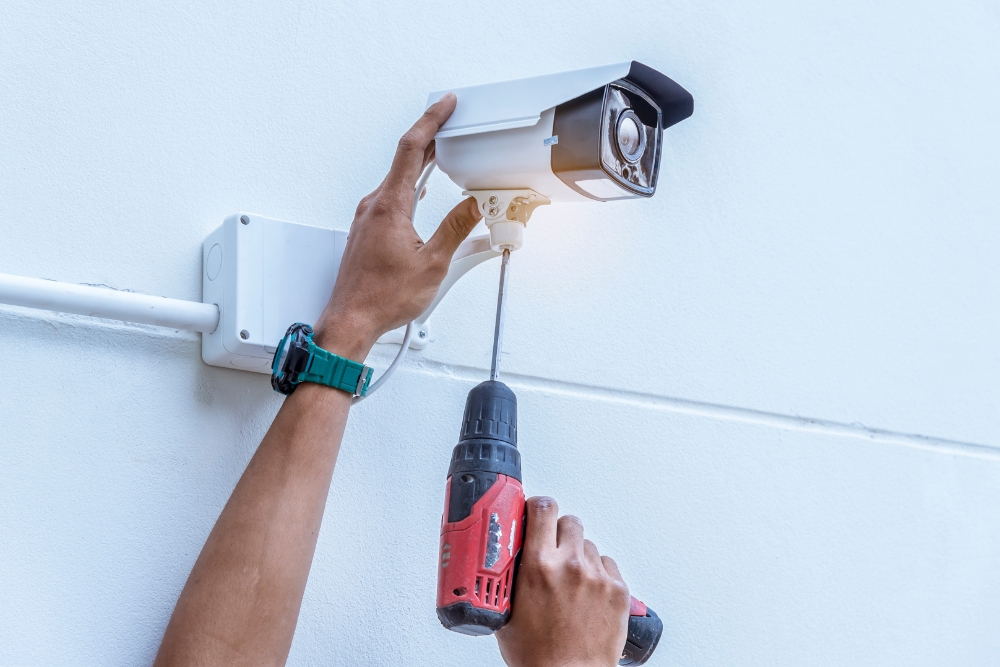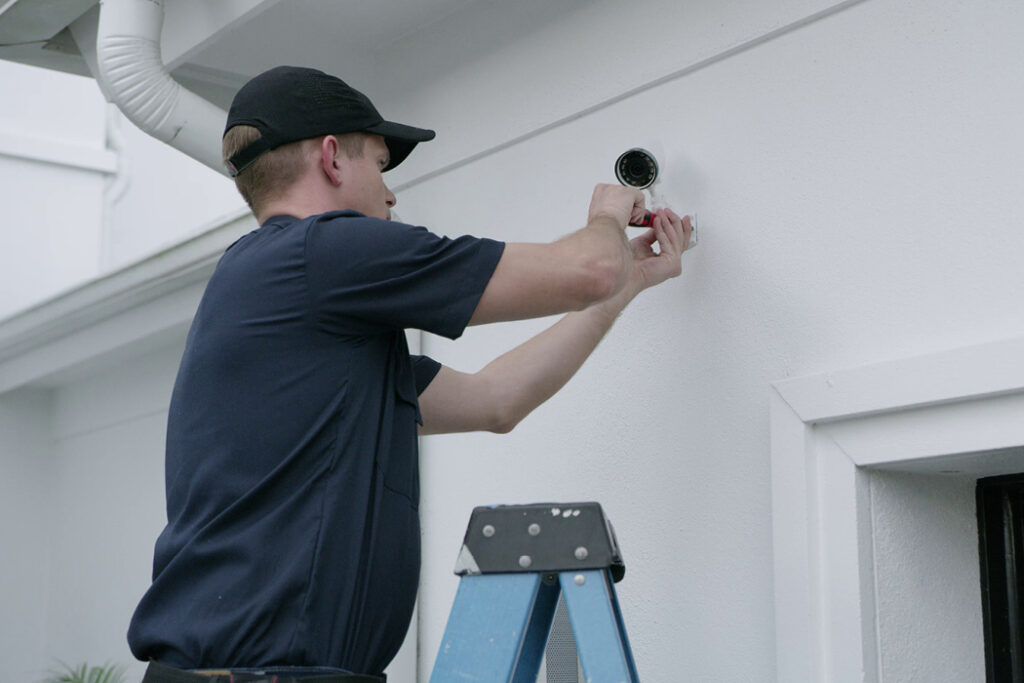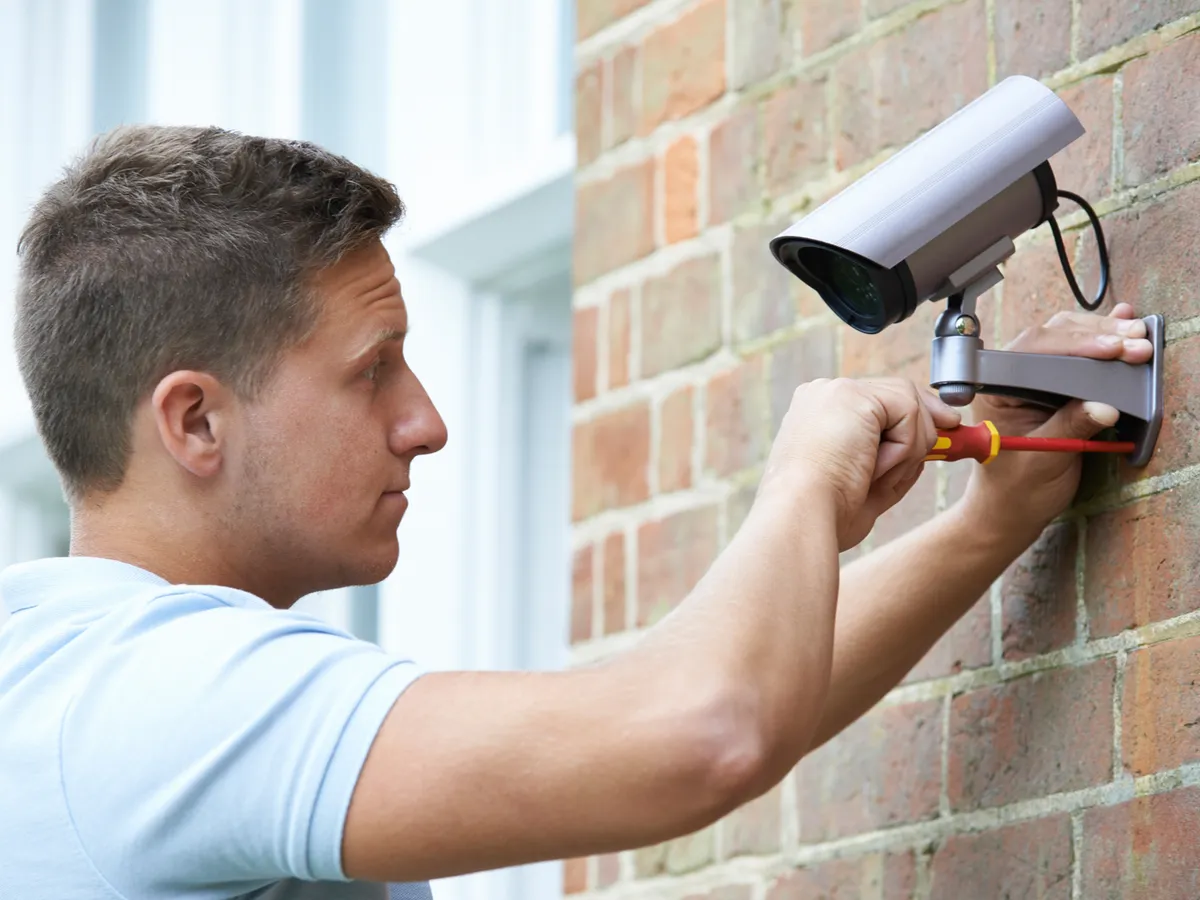With the increase in residential break-ins, home security has become a crucial concern for property owners worldwide. Recent crime statistics show that a burglary occurs every 30 seconds in the UK, highlighting the urgent need for strong security measures.
One of the most effective ways to protect homes from unwanted intrusions is by installing security cameras. These electronic devices act as both a visible deterrent and an active security measure, making potential burglars think twice before targeting a property with cameras.
Research supports the effectiveness of security cameras in preventing break-ins:
- Properties with visible security cameras experience up to 50% fewer break-in attempts
- 60% of burglars avoid homes with security systems
- Areas with widespread camera coverage report significant drops in property crime rates
In addition to basic surveillance, modern security cameras offer several benefits:
- 24/7 monitoring capabilities
- Real-time alerts to homeowners’ smartphones
- High-definition video recording for evidence collection
- Integration with other smart home security features
As criminals become more sophisticated, the need for comprehensive home protection becomes even more important. Installing security cameras is a proactive way to protect homes, families, and valuable belongings from the growing threat of break-ins.
Understanding Home Security Systems
Modern integrated security systems serve as comprehensive protection networks, combining multiple components to safeguard properties against unauthorized access and criminal activities. These sophisticated systems operate through interconnected devices that work in harmony to detect, deter, and document potential security threats.
Essential Components of an Integrated Security System:
1. CCTV Surveillance Cameras
- High-resolution video capture
- Night vision capabilities
- Remote viewing access
- Motion-activated recording
2. Motion Detection Systems
- Infrared sensors
- Microwave detection
- Dual-technology sensors
- Pet-immune options
3. Alarm Systems
- Audible sirens
- Silent alerts
- Mobile notifications
- Back-to-base monitoring
4. Access Control Mechanisms
- Keypad entry systems
- Biometric scanners
- Smart card readers
- Video intercoms
Smart integration elevates these components through automated responses and centralised control. When motion sensors detect movement, cameras automatically focus on the area, lights activate, and homeowners receive instant smartphone notifications. This synchronised approach creates a robust security shield that adapts to real-time threats.
The integration of artificial intelligence and machine learning enables these systems to distinguish between routine activities and genuine security threats, reducing false alarms while maintaining vigilant protection. Cloud connectivity ensures continuous monitoring and data storage, allowing property owners to access their security feeds from anywhere in the world.
Additionally, the rise of smart home technology has further enhanced the effectiveness of these security systems. With features like remote access, automated alerts, and AI-driven analytics, homeowners can now enjoy a level of control and security that was previously unimaginable. The future of home security lies in this seamless integration of advanced technology into our everyday lives.
How Security Cameras Deter Break-Ins
Home security camera installation are more than just tools for recording; they play a crucial role in preventing break-ins. Studies show that potential burglars actively steer clear of properties with visible security cameras, viewing them as risky targets.
The Impact of Visible Cameras
A detailed investigation by the University of North Carolina uncovered a startling fact: 60% of burglars would immediately skip over a house displaying security cameras. This finding highlights the significance of having visible surveillance systems in place.
The mere sight of cameras creates a psychological barrier for criminals, compelling them to confront the heightened danger of being recognised and apprehended.
Understanding the Deterrent Effect
The deterrent effect of security cameras operates through various psychological processes:
- Immediate Recognition: When criminals see visible cameras, they understand that someone is actively monitoring the area and they are being watched.
- Evidence Creation: Burglars are aware that security cameras capture footage that can be used as evidence against them.
- Risk Assessment: The presence of cameras suggests that there may be additional security measures in place, making the property less appealing to potential intruders.
The Risk Assessment Process
Research on criminal behaviour reveals that burglars carefully evaluate the risks before attempting a break-in. They consider factors such as the likelihood of getting caught, identified, or arrested. Properties with visible security measures indicate:
- Higher chance of detection
- Increased likelihood of identification
- Greater probability of arrest
- Risk of facing longer sentences due to video evidence
Creating a Zone of Deterrence
The impact of security cameras goes beyond individual homes. When multiple houses in a neighbourhood install these devices, it creates what is known as a zone of deterrence. This phenomenon discourages criminal activity throughout the entire area.
The Power of Statistics
Recent statistics reveal that homes with visible security cameras experience up to 50% fewer break-in attempts compared to unprotected residences. This significant reduction can be attributed to a fundamental principle: criminals prefer easy targets with minimal risk of being detected.
By understanding how security cameras deter break-ins through psychological mechanisms and risk assessments, homeowners can make informed decisions about their own security measures and contribute to creating safer communities.
Outdoor Versus Indoor Cameras: Which is More Effective?
The strategic placement of security cameras plays a vital role in maximising deterrence effectiveness. Both outdoor and indoor cameras serve distinct yet complementary functions in a comprehensive security system.
Outdoor Cameras:
- Act as visible deterrents to potential intruders
- Provide wide-angle coverage of property perimeters
- Monitor entry points and blind spots
- Weather-resistant construction for durability
Indoor Cameras:
- Track movement within the property
- Guard valuables in specific rooms
- Monitor internal entry points
- Provide backup coverage if outdoor cameras are compromised
Strategic placement at key entry points amplifies the effectiveness of both camera types. High-traffic areas such as front doors, ground floor windows, and garage entrances benefit from dual coverage through both outdoor and indoor cameras.
Modern high-resolution CCTV systems enhance surveillance capabilities through:
- 4K video quality for clear identification
- Night vision capabilities
- Wide-angle lenses for comprehensive coverage
- Cloud storage for secure footage backup
- Real-time mobile notifications
- Two-way audio communication
The most robust security solutions incorporate both outdoor and indoor cameras in a layered approach. This dual-camera strategy creates multiple barriers against potential break-ins whilst providing comprehensive surveillance coverage of the entire property.

Advanced Features Enhancing Camera Deterrence
Modern security cameras come equipped with sophisticated features that transform passive surveillance into active deterrence systems. Motion detection technology serves as the cornerstone of these advanced capabilities, triggering immediate responses when suspicious activity is detected. Click here to learn about a guide to choosing the right monitored security for your property.
Integrated Alarm Systems
- Motion sensors activate high-decibel sirens (95-120 dB)
- Strobe lights disorient potential intruders
- Automated emergency calls to monitoring centres
- Instant activation of connected security protocols
The combination of bright floodlights and security cameras creates a powerful deterrent effect. When motion sensors detect movement, they trigger intense illumination that:
- Startles and exposes potential intruders
- Enables clear video capture in low-light conditions
- Creates a visible security presence
- Reduces shadowy areas where criminals might hide
Smart Device Integration
Real-time smartphone notifications put homeowners in control of their security system:
- Instant alerts with video clips of detected motion
- Live video feed access from anywhere
- Two-way audio communication capabilities
- Remote activation of sirens and lights
- Ability to contact authorities directly through security apps
These interconnected features create a robust security ecosystem that actively deters break-ins through immediate response protocols and visible deterrence measures. The integration of motion detection with automated responses significantly reduces the window of opportunity for potential intruders while maintaining constant vigilance.
Moreover, advancements in night vision technology have further enhanced the effectiveness of these surveillance systems, allowing for clear visibility even in complete darkness.
Comprehensive Security Through System Integration
Modern security systems achieve maximum effectiveness through seamless integration of multiple protective layers. A well-designed system connects surveillance cameras with smart access controls and alarm mechanisms, creating an impenetrable security shield.
Layered Protection Components:
- Digital door locks with remote access capabilities
- Motion-activated cameras linked to alarm systems
- Smart lighting systems responding to detected movement
- Mobile-controlled access management
- Real-time security notifications
Back-to-base monitoring adds a critical layer of protection by connecting the home security system to professional monitoring centres. When threats are detected, trained security personnel assess the situation and dispatch emergency services within minutes.
Smart home integration elevates security effectiveness through automated responses:
- Doors automatically lock when security systems are armed
- Lights activate in response to suspicious activity
- Cameras begin recording when motion sensors are triggered
- Access logs track entry attempts and system interactions
The interconnected nature of these systems creates multiple barriers against potential intruders. When one component detects a threat, the entire system responds in coordination. A triggered motion sensor can activate cameras, illuminate the area, sound alarms, and alert both homeowners and monitoring centres simultaneously.
This integrated approach transforms individual security components into a comprehensive protection network, significantly reducing vulnerability to break-ins while providing enhanced control and monitoring capabilities.
Additional Measures Complementing Camera Installation
Security cameras work best when paired with robust physical security measures. High-quality deadbolts and reinforced door frames create formidable barriers at entry points, while window locks and security screens add crucial layers of protection.
The power of community vigilance amplifies camera effectiveness through neighbourhood watch programmes. Active participation creates a network of watchful eyes, with residents:
- Reporting suspicious activities
- Sharing security camera footage when needed
- Coordinating holiday house checks
- Maintaining communication through dedicated social media groups
Occupancy simulation stands as a vital deterrent when properties are vacant. Smart home automation enables:
- Randomised lighting patterns mimicking natural household activities
- Scheduled TV or radio sounds during peak break-in hours
- Automated curtain movements
- Timed garden sprinkler activation
These measures create an illusion of occupancy that complements security camera systems. Strategic placement of motion-activated lights around entry points adds another layer of deterrence, flooding potential intruders with bright illumination while triggering camera recordings.
The combination of sturdy physical barriers, community surveillance, and convincing occupancy simulation transforms a camera-equipped property into a highly secure environment that actively discourages criminal attempts.
Benefits Beyond Deterrence: Evidence Collection and Remote Management
Security cameras are powerful tools for investigating incidents after they occur and for monitoring in real-time. High-quality footage captured during break-in attempts provides law enforcement with crucial evidence for identifying and apprehending perpetrators. The recorded video can reveal:
- Entry and exit points used
- Physical descriptions of intruders
- Vehicles involved
- Timeline of events
- Items taken or damaged
Secure Storage of Evidence
Modern security systems use cloud storage technology to protect recorded footage. This secure digital preservation method ensures evidence remains intact and accessible even if cameras are damaged or stolen during a break-in. Law enforcement can receive immediate access to relevant clips through secure sharing features.
Transforming Property Monitoring
The integration of smartphone connectivity changes how homeowners keep an eye on their properties. Through dedicated mobile apps, users can:
- View live camera feeds from any location
- Receive instant motion detection alerts
- Save and share important footage
- Communicate with visitors through two-way audio
- Adjust camera settings remotely
These remote management capabilities prove invaluable for:
- Checking on pets during work hours
- Monitoring deliveries
- Verifying children’s safe arrival home
- Keeping watch during holidays
- Responding to security alerts in real-time
The combination of evidence collection and remote access creates a comprehensive security solution that extends well beyond simple deterrence.
Addressing Privacy and Security Concerns
The integration of surveillance technology into homes raises legitimate privacy considerations that require careful attention. Modern security cameras can capture sensitive information about daily routines, personal interactions, and private moments within residential spaces.
Key Privacy Challenges:
- Unauthorised access to camera feeds
- Data breaches exposing stored footage
- Potential misuse of surveillance information
- Impact on household members’ privacy
Modern security systems incorporate robust privacy safeguards to address these concerns. Advanced encryption protocols protect video feeds and stored data from unauthorised access. Multi-factor authentication adds an extra layer of security, requiring verified credentials for system access.
Built-in Privacy Features:
- Customisable privacy zones
- Scheduled recording times
- Encrypted data transmission
- Secure cloud storage solutions
- User access management controls
To maintain optimal security while protecting privacy, implementing specific measures proves essential:
- Regular password updates
- Network security assessment
- Firmware updates installation
- Access log monitoring
- Camera placement optimisation
The placement of cameras requires strategic consideration to balance security needs with privacy protection. Positioning cameras to avoid capturing neighbours’ properties or private areas within the home helps maintain appropriate boundaries while ensuring effective surveillance of critical entry points.
In professional AV settings, the importance of security cannot be overstated. This principle also extends to the use of surveillance technology in healthcare environments, where protecting patient privacy with secure video and voice conferencing is paramount.
Cost Effectiveness and Insurance Benefits
Installing a comprehensive home security camera system represents a strategic financial investment that pays dividends in multiple ways. The initial setup costs are offset by significant long-term savings:
Protection Against Financial Losses
- Average burglary losses amount to £3,000-£5,000 per incident
- Security cameras help prevent theft of valuable items and irreplaceable personal belongings
- Documented reduction in break-in attempts saves potential repair costs from property damage
Insurance Premium Benefits
- Many UK insurance providers offer up to 20% discount on home insurance premiums
- Additional discounts available when combining cameras with:
- Smart door locks
- Motion sensors
- Professional monitoring services
- Enhanced claim support through video evidence
Cost-Saving Features
- Modern systems include:
- Energy-efficient LED indicators
- Motion-activated recording to save storage space
- Cloud storage options eliminating need for local hardware
- Remote monitoring reducing need for security personnel
The return on investment becomes apparent when comparing the one-time installation cost against potential theft losses and reduced insurance premiums. A basic camera system starting at £500 can lead to insurance savings of £100-£200 annually, while protecting assets worth thousands of pounds.

Conclusion
The evidence shows that security camera installations are highly effective in preventing break-ins and burglaries. A complete home security system with strategically positioned cameras provides multiple layers of protection, making properties much less appealing to potential intruders.
Modern security technology offers:
- Real-time monitoring capabilities
- High-definition video evidence collection
- Smart device integration
- Remote access convenience
- Insurance premium benefits
The combination of visible deterrence, advanced features, and integrated monitoring turns homes into fortified sanctuaries. Professional security camera installation is a valuable investment in protecting families, properties, and valuables.
Taking action to protect homes with security camera systems brings both immediate and long-term advantages. The peace of mind that comes from knowing a property is secured 24/7 is priceless. By choosing to install comprehensive security measures today, we can create a safer and more secure living environment for many years ahead.
















